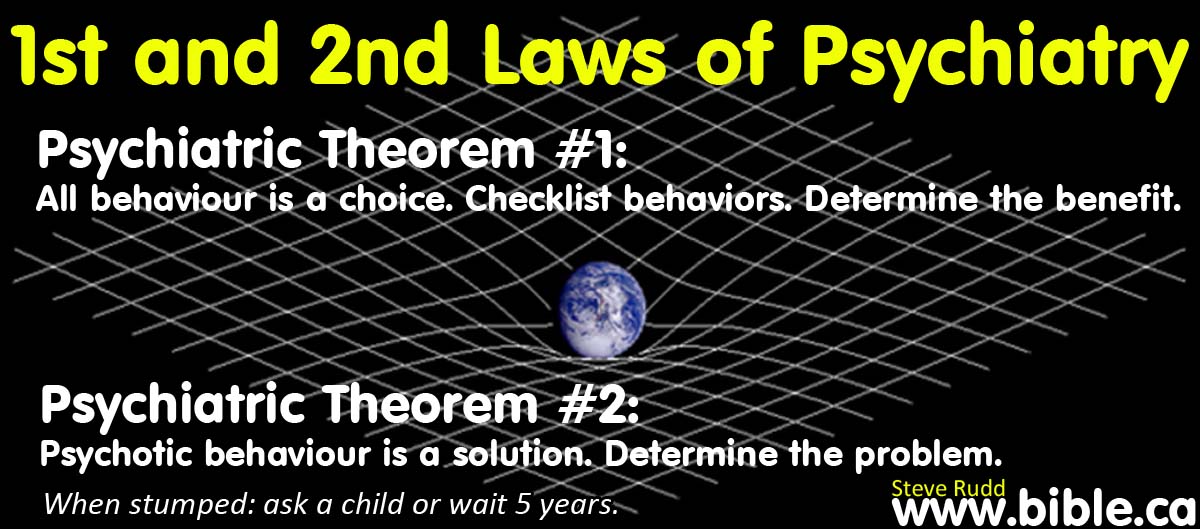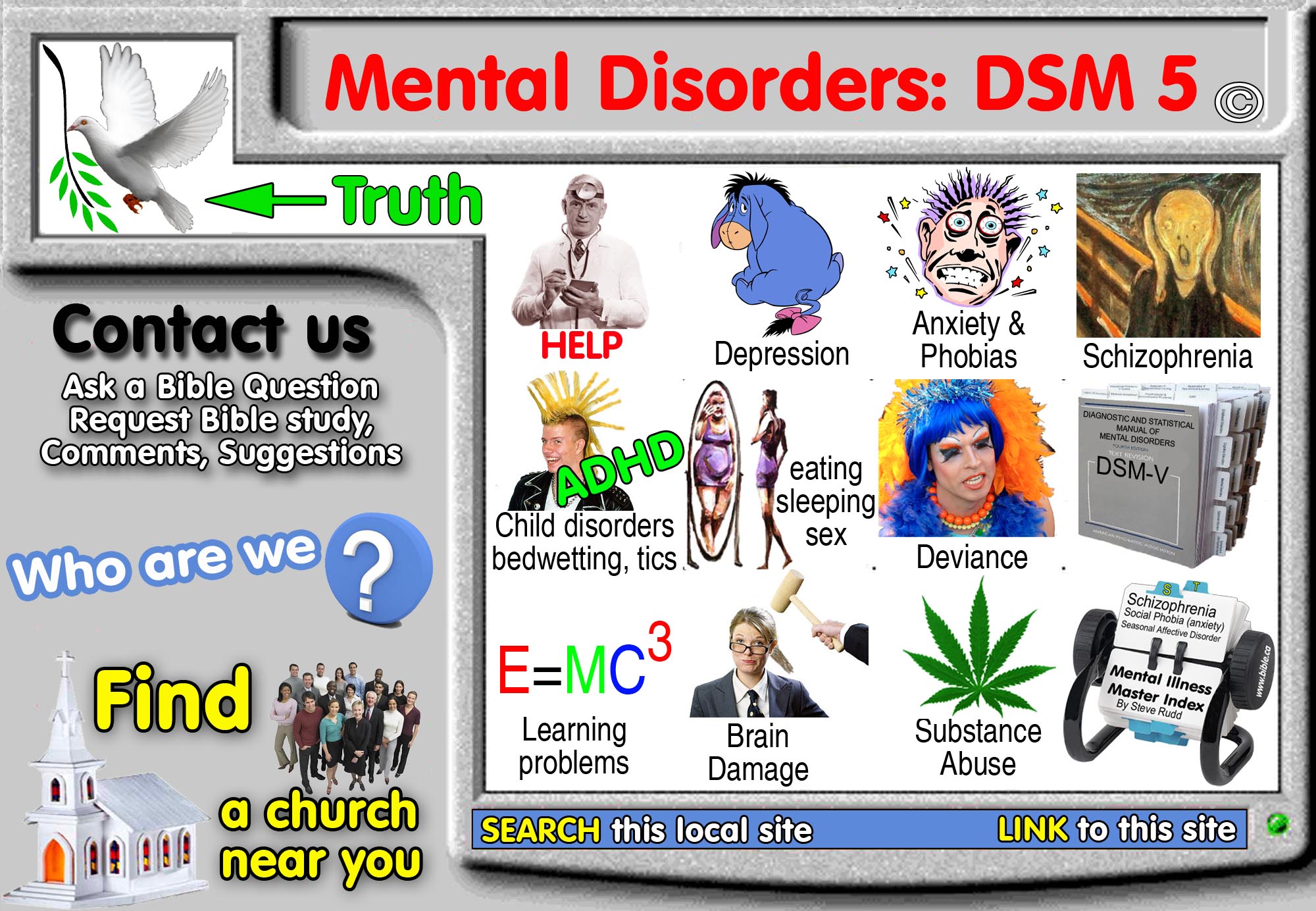The case of "Crutches" (Hysteria: faked physical illness for personal benefit)
Casebook of Biblical Psychiatry © Version 7
(CBP-7)
|
Based upon Real Psychotic behaviour |
![]() See
also: History of Psychiatry homepage
See
also: History of Psychiatry homepage
Casebook of Biblical Psychiatry© brings the principles of Biblical Psychiatry to life based upon real-world cases and familiarizes Christians with different types of situations. This practical companion volume to Biblical Psychiatry© includes not only diagnosis, but also in-depth discussions by experienced Christians for Biblical approaches to treatment. This meticulously detailed volume of dynamic real-life case studies is simply a "must read" for all clinical Psychiatrists, mental health care professionals and Christians interested in expert opinion on today's treatment approaches. Psychiatric students, educators, and practitioners-as well as social workers, nurses, medical physicians, and interested laypersons-will find this unique volume of inestimable value in their day-to-day work.
|
|
|
|
|
The case of (faked physical illness for personal benefit)
|
|
|
|
||||||
|
|
The case of "Crutches" |
|||||
|
|
Biopsychiatric labels DSM-5 |
Hysteria |
||||
|
|
Checklist Behaviours DSM-7 |
Pride, Deception, lying |
||||
|
|
Insights MMPI-7 |
|
||||
|
|
Quick Pick EDS-7.1 |
Complaints: I feel Unnoticed, I feel Unsuccessful |
||||
|
|
Self-disablement EDS-7.2 |
Physical disability, needed crutches |
||||
|
|
Chemical imbalance EDS-7.3 |
No. Never ingested opium. Although before the era of prescribed psychiatric drugs (1950's) which create chemical imbalances in the brain, at this point in history Opium was the only drug widely used to create chemical imbalances in the brains of the insane. |
||||
|
|
Benefits EDS-7.4 |
Fun, entertainment, relief from boredom and monotony: EDS-7.4.2 Attention seeking, Pride, Praise, Honour, Fame: EDS-7.4.3 Escape duty or life situation: EDS-7.4.4 |
||||
|
|
Monetary EDS-7.5 |
- |
||||
|
|
Annoyance Scale EDS-7.6 |
Low |
||||
|
|
Diagnostic Laws EDS-7.7 |
Law of Narcissistic Behaviour Choice (NBC) EDS-7.7.1.NBC Law of Derivative Personal Benefit (DPB) EDS-7.7.2.DPB Law of Symbiotic Treasury Parasitosis (STP) EDS-7.7.6.STP Law of Diagnostic Anosognosia Relativism (DAR) EDS-7.7.7.DAR Law of Habitual Smokescreen Decoy (HSD) EDS-7.7.10.HSD Law of Locus Pentaphasic Transmutation (LPT) EDS-7.7.11.LPT Law of Pediatric Multifarious Obfuscation (PMO) EDS-7.7.12.PMO |
||||
|
|
Determine the Problem |
Felt like a failure as a mother and wanted a famous successful son she could brag to all her friends about. |
||||
|
|
Ask a Child |
We should get that magician to come to my next birthday party. EDS-7.7.12.PMO |
||||
|
|
5 years later EDS-7.7.LPT |
Jung became the "son" she always wanted to boast about and be proud of. |
||||
|
|
|
|||||
The case of "Crutches"
(Carl Jung, psychiatrist and founder of analytical psychology, a woman, motivated by fame, entertainment and pride fabricates illnesses and pretends Jung cures her, then advertises his skills as a doctor for her own personal satisfaction):
"A middle-aged woman, apparently with a strong religious bent, appeared one day. She was fifty-eight years old, and came on crutches, led by her maid. For seventeen years she had been suffering from a painful paralysis of the left leg. I placed her in a comfortable chair and asked her for her story. She began to tell it to me, and how terrible it all was the whole long tale of her illness came out with the greatest circumstantiality. Finally I interrupted her and said, "Well now, we have no more time for so much talk. I am now going to hypnotize you." I had scarcely said the words when she closed her eyes and fell into a profound trance without any hypnosis at all! I wondered at this, but did not disturb her. She went on talking without pause, and related the most remarkable dreams that represented a fairly deep experience of the unconscious. This, however, I did not understand until years later. At the time I assumed she was in a kind of delirium. The situation was gradually growing rather uncomfortable for me. Here were twenty students present, to whom I was going to demonstrate hypnosis! After half an hour of this, I wanted to awaken the patient again. She would not wake up. I became alarmed; it occurred to me that I might inadvertently have probed into a latent psychosis. It took some ten minutes before I succeeded in waking her. All the while I dared not let the students observe my nervousness. When the woman came to, she was giddy and confused. I said to her, "I am the doctor, and everything is all right." Whereupon she cried out, "But I am cured!" threw away her crutches, and was able to walk. Flushed with embarrassment, I said to the students, "Now you've seen what can be done with hypnosis!" In fact I had not the slightest idea what had happened. That was one of the experiences that prompted me to abandon hypnosis. I could not understand what had really happened, but the woman was in fact cured, and departed in the best of spirits. I asked her to let me hear from her, since I counted on a relapse in twenty-four hours at the latest. But her pains did not recur; in spite of my skepticism, I had to accept the fact of her cure. At the first lecture of the summer semester next year, she reappeared. This time she complained of violent pains in the back which had, she said, begun only recently. Naturally I asked myself whether there was some connection with the resumption of my lectures. Perhaps she had read the announcement of the lecture in the newspaper. I asked her when the pain had started, and what had caused it. She could not recall that anything had happened to her at any specific time nor could she offer the slightest explanation. Finally I elicited the fact that the pains had actually begun on the day and at the very hour she saw the announcement in the newspaper. That confirmed my guess, but I still did not see how the miraculous cure had come about. I hypnotized her once more that is to say, she again fell spontaneously into a trance and afterward the pain was gone. This time I kept her after the lecture in order to find out more about her life. It turned out that she had a feeble-minded son who was in my department in the hospital. I knew nothing about this because she bore her second husband's name and the son was a child of her first marriage. He was her only child. Naturally, she had hoped for a talented and successful son, and it had been a terrible blow when he became mentally ill at an early age. At that time I was still a young doctor, and represented everything she had hoped her son might become. Her ambitious longing to be the mother of a hero therefore fastened upon me. She adopted me as her son, and proclaimed her miraculous cure far and wide. In actual fact she was responsible for my local fame as a wizard, and since the story soon got around, I was indebted to her for my first private patients. My psychotherapeutic practice began with a mother's putting me in the place of her mentally ill son! Naturally I explained the whole matter to her, in all its ramifications. She took it very well, and did not again suffer a relapse. That was my first real therapeutic experience I might say: my first analysis. I distinctly recall my talk with the old lady. She was intelligent, and exceedingly grateful that I had taken her seriously and displayed concern for her fate and that of her son. This had helped her." (Memories Dreams Reflections, Carl Gastav Jung, 1961 AD, p 118)
DISCUSSION:
Good grief! Talk about the fore-runner of "fake-healer" Benny Hinn. The woman was the center of attention in a public setting on two occasions which she found entertaining. Then, motivated by pride and the desire to be famous, she went around telling everyone how Jung had cured her. It is difficult to tell who the greater fraudster is in this story; the woman, or Jung who proclaimed, "I am the doctor, and everything is all right."
This is a classic case of Hysteria, where a person manufactures a psychotic behaviour, or some self-disability for personal gain. In this case the stupid woman didnít realize that Jung was not a healer of medical diseases, but "mental diseases". She faked the wrong kind of "illness" based upon his specialty. Although Jung clearly saw what she was doing, he discusses her theatre as though any of it should be taken seriously. His comment, "it occurred to me that I might inadvertently have probed into a latent psychosis" is a humiliating admission. Jung would have been better off just forgetting the whole ruse. But she made his "hall of fame" because it was her, who launched his career into the forefront. So here you have a fake doctor of psychotherapy (now mostly discarded) being launched into practice by a fake (hysteric), who psychotically deluded herself that Jung was her own son.
If this was only a story of a woman faking an illness, it would never have made the Casebook of Biblical Psychiatry. The key is to remember that there is no line between the manufactured physical diseases and manufactured psychotic behaviour. Had the woman known that Jung was a specialist in Psychiatry, not medicine, she would have simply manufactured a "mental disorder" for him to "cure".
Benefits from behaviour: This illustrates the Law of Narcissistic Behaviour Choice (NBC) EDS-7.7.1.NBC
- Fun, entertainment, relief from boredom and monotony: EDS-7.4.2. It is rather self-evident that she was having a lot of fun playing the part of a sickly patient for the doctor to cure.
- Attention seeking, Pride, Praise, Honour, Fame: EDS-7.4.3. Clearly the central motivation in all her faked illness.
3. Escape duty or life situation: EDS-7.4.4. She did not like the idea that she would die having no famous sons. Her staged delusion with Jung gave her an escape from her reality.
Diagnostic laws that are seen illustrated in the case of "Crutches":
- She calculated the cost of walking around for several months as a disabled cripple on crutches was worth the benefit of stroking her ego. This illustrates the Law of Derivative Personal Benefit (DPB) EDS-7.7.2.DPB
- In a classic example of STP, the fake patient and fake doctor needed each other equally. She needed him to cure her of her fake disease and he needed her to spread this fake healing far and wide to kick his private practice as a psychotherapist into high gear. This illustrates the Law of Symbiotic Treasury Parasitosis (STP) EDS-7.7.6.STP
- Whatever diagnosis Jung made of the woman, she would disregard it, but willingly accept his diagnostic "label". She really didn't care what label the "smart doctor" gave her, she desperately needed to be labeled as genuinely sick so he could cure her. Although she would go around claiming her cured her of "disease x" she knew it was a false diagnosis since she was in full control of her "disease". This illustrates the Law of Diagnostic Anosognosia Relativism (DAR) EDS-7.7.7.DAR
- Her behaviour of walking around on crutches for months hid the real reason for the behaviour. She engaged in faking her disability as a smokescreen for her real goal of satisfying her bizarre craving for having a famous son. This illustrates the Law of Habitual Smokescreen Decoy (HSD) EDS-7.7.10.HSD
- At the beginning of the five years, she was the mother of a "loser son", in whom she had no pride or the ability to boast. At the end of 5 years, she had a world famous son who she could take pride in "making him what he is" and boast to her friends about. This illustrates the Law of Locus Pentaphasic Transmutation (LPT) EDS-7.7.11.LPT
6. A child sees a woman on stage acting sick with a man acting like a doctor. The man casts a magic spell on the woman and she jumps up cured. What a great magic trick! I want him to come to my next 6th birthday party and do that trick on me. This illustrates the Law of Pediatric Multifarious Obfuscation (PMO) EDS-7.7.12.PMO
(Casebook of Biblical Psychiatry©, Version 7)
Note: Although these are real case stories, the names and details have been changed to hide the identities of the people. This practice follows the standards of medical case history publication.
By Steve Rudd: Contact the author for comments, input or corrections.
Send us your story about your experience with modern Psychiatry


